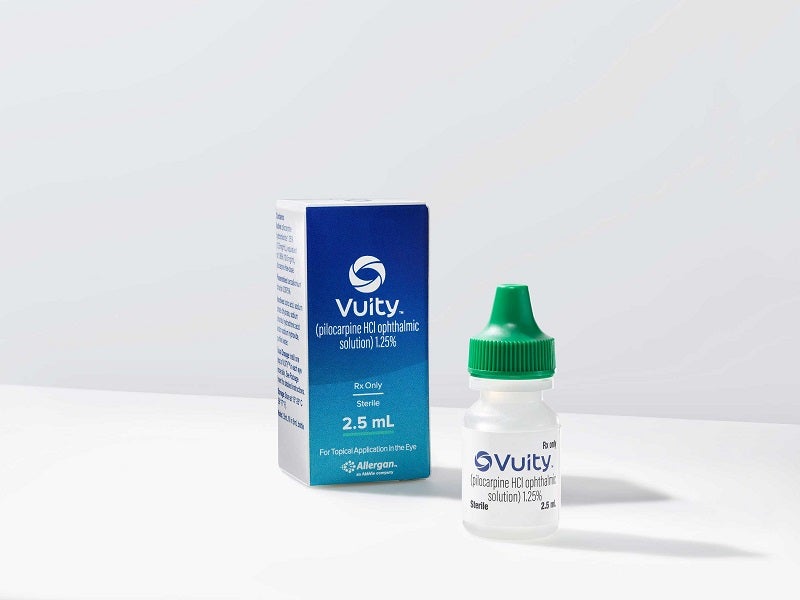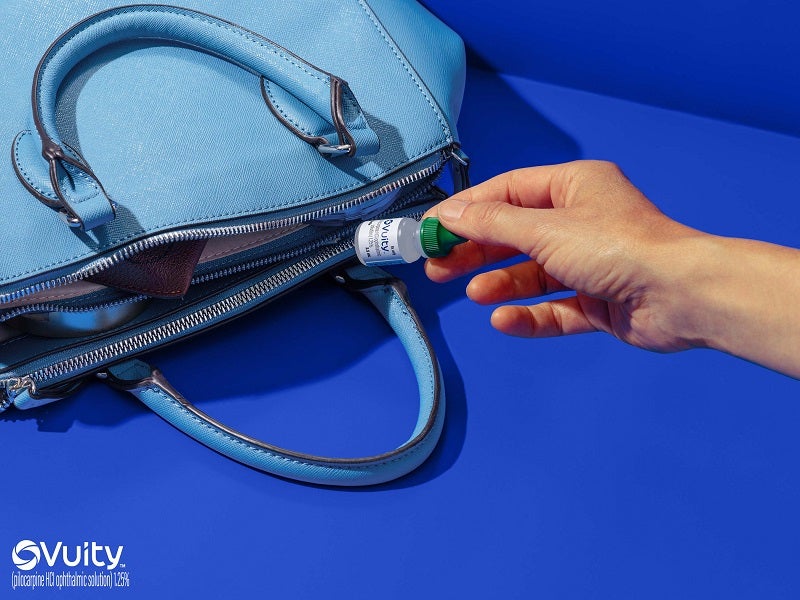Vuity™ (pilocarpine HCl ophthalmic solution) is a once-daily prescription eye drop indicated for the treatment of presbyopia, commonly known as age-related blurry near vision in adults.
Vuity was developed by Allergan, a subsidiary of US-based pharmaceutical company AbbVie. It is an optimised formulation of pilocarpine that is an established eye care treatment delivered utilising AbbVie’s proprietary pHast™ technology, which allows the drug to quickly adapt to the physiologic pH of the tear film.
The brand name Vuity was developed in partnership with Brand Institute, a pharmaceutical and healthcare-related branding agency based in the US.
The drug is available as an isotonic, colourless, sterile ophthalmic solution containing 1.25% (12.5mg/ml) of pilocarpine hydrochloride.
Regulatory approvals for Vuity
AbbVie submitted a new drug application (NDA) to the US Food and Drug Administration (FDA) for investigational AGN-190584 (1.25% pilocarpine HCl ophthalmic solution) for the treatment of presbyopia in February 2021, while the approval was granted in October 2021.
Presbyopia causes and symptoms
Presbyopia is a common and progressive eye disorder that develops gradually and affects adults aged about 40 years. It impairs the eye’s ability to concentrate on close objects. The disorder affects approximately 128 million adults in the US.
In a non-presbyopic vision, the shape of the transparent lens behind the iris may change and concentrate light to the retina, which makes it easier to see closely placed objects, while in a presbyopic eye, the clear lens hardens and does not change shape as quickly, making it harder to concentrate on close objects.
Symptoms of presbyopia include blurred vision and/or feeling tired while reading or doing any activity that requires near vision, headaches and eye strain.
Vuity’s mechanism of action
Vuity (AGN-190584) is a cholinergic muscarinic agonist that stimulates muscarinic receptors in smooth muscles such as the iris sphincter and ciliary.
The mechanism of action involves contraction of the iris sphincter muscle, which constricts the pupil to improve near and intermediate vision acuity while maintaining some pupillary responsiveness to light.
The drug also contracts the ciliary muscle, which may make the eye more myopic.
Clinical trials on Vuity
The FDA’s approval for Vuity was based on the positive outcomes of two pivotal, 30-day, randomised, double-masked, vehicle-controlled phase three clinical studies, named GEMINI-1 and GEMINI-2.
The studies assessed the safety, efficacy and tolerability of the drug for the treatment of presbyopia.
A total of 750 presbyopia patients, aged between 40 and 55 years, were enrolled in the studies. In both the studies, patients were randomised in a 1:1 ratio to receive either one drop of Vuity or placebo once daily in each eye.
The primary endpoint of the studies was the proportion of Vuity-treated patients gaining the ability to read three additional lines on a reading chart or more in mesopic (low light), high contrast, binocular Distance Corrected Near Visual Acuity (DCNVA), without losing more than one line (five letters) of Corrected Distance Visual Acuity (CDVA) on the third hour of day 30, compared to the placebo.
In GEMINI-1 study, 31% of patients treated with Vuity achieved the primary goals compared to 8% of patients treated with placebo.
In GEMINI-2 study, 26% of patients treated with Vuity achieved the primary measure outcomes compared to 11% treated with placebo.
On day 30, the drug showed its effect in as early as 15 minutes after administration and its effect continued for up to six hours, improving the near and intermediate vision without impacting distance vision.
No major adverse events were reported among the patients treated with Vuity in either of the clinical trials. Headaches and redness in the eye were the most frequent adverse effects.





